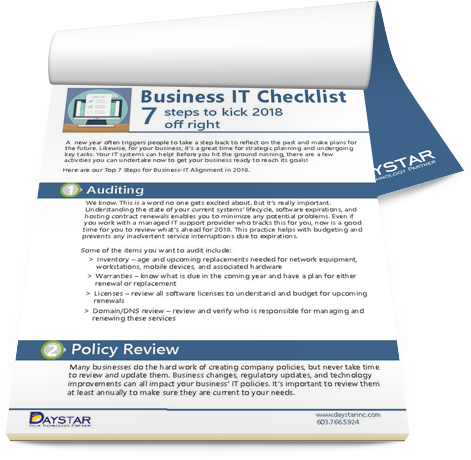Business and technology go hand in hand these days, no matter the size of a business. In fact, small businesses are often the people who need the most tech support so they can keep their eyes on the prize: the health of their business. Technology offers small businesses the opportunity to compete with larger enterprises because they now have access to the same scalable services as big companies at an affordable price point. But knowing what technology to focus on first or how to choose the right IT partner can often be a tough decision for business owners.
This article details some basic business technologies that can help enterprises of any size. It also dives into how business owners can decide what they need from a tech support partner and the benefits of having outsourced IT support. So if you’re wondering how to keep your business up to date with the tech world, read on!
Boost Your Bottom Line with These Essential Technology Solutions
There are plenty of information systems and business applications out there that go further than businesses might have imagined. When people think of business technology, they may imagine the tried and true Microsoft programs such as Excel, Word, and PowerPoint, but there’s much more out there. The world of business technology is a fast-moving train, and to secure the best shot at success, businesses need to be on it.
The trouble many business owners have is choosing the right tech for them. There are tons of software and programs that can help a business stay organized and optimized, but five, in particular, stand out as the most helpful.
- Management software.
This could be project management applications, customer relationship management (CRM) programs, or content management systems (CMS). The benefit of utilizing management software is that it helps to keep everyone on the same page. Projects stay on track with assigned due dates and detailed task lists, and accountability is increased when you can assign tasks to specific people. Most of these are internet-based, too, so you can use them whether everyone is in the office or spread across the country.
- Digital marketing tools. Things like social media marketing, email marketing, and content marketing can all go a long way to growing your business, but they don’t happen overnight. These campaigns take a lot of planning and leg work, and if you don’t have the right tools in place, it might take up days of your staff’s time that could be spent on other tasks. Find tools that grant easy automation and scheduling of posts and emails so your team can put their minds to bigger projects in the company.
- Cloud-based storage. Online storage options are quickly becoming the norm in business settings because they offer more protection and security than traditional network options. Cloud-based storage services can more effectively protect company data from cyber threats and offer peace of mind that data won’t be lost if the servers go down, such as in a natural disaster or power outage.
- Video meeting software. Think Microsoft Teams, Zoom, Google Hangouts, BlueJeans and all the other video meeting platforms that have come to the forefront of business in the last few years. Video meetings offer ways for people to connect without being in the same room, which expands prospects and presents new business opportunities.
- Updated computers. Whether your team works with Apple or PC, you want to make sure your operating systems and networks are always up to date. New technology is constantly being released and revitalized and keeping devices updated with the latest iterations is an easy way to protect data and streamline workflows.
- Security technology. Small businesses used to be able to purchase and install their own antivirus software and be protected from major online threats. Today, however, businesses need a more robust cybersecurity plan that includes network and data protection in addition to those antivirus and antimalware services. The needs of every business are unique, but regardless of size, cybersecurity is necessary for any organization to operate safely in today’s marketplace.
These are just a few basic categories of small business tech that can help your business grow, but with them, you can put your business on the path to success.
Make Sure Your Business Has the Right Tech Support
Information technology changes and adapts to all kinds of business models, and tech support services can range greatly to fit all the different needs that come with them. This is great because it means no matter what your business is struggling with, there’s an IT partner for you. However, it might also seem intimidating if you aren’t sure what you need from an agency.
When looking for the right kind of tech support for your business, there are a few things you can consider to choose the most beneficial services:
- Identify your pain points.
It can be hard to find good help when you don’t know what you’re struggling with. Every business, whether it’s a startup or national company, has areas they could improve on or need assistance managing. Before you start researching managed service providers or outsourced IT agencies, take the time to outline what’s standing in the way of reaching your business goals. Is your network constantly crashing? Do you have persisting virus or malware issues? Are you not sure of the safest place to store company data? Do you struggle with supporting your employees’ tech problems? These pain points allow you to ask specific questions when interviewing potential IT partners and help you choose one that will find an appropriate solution for your business.
- Ask your team what they need. You might be surprised by things your team will bring to your attention when you ask about IT needs. Maybe the word processing tools are out of date or there’s a demand for project management software to keep better track of deliverables and client deadlines. Consulting with your employees is a great way to find issues that might not affect your business from a strategic standpoint but do slow down daily tasks and productivity.
- Know what you have and what you need. When you're in the throes of slow connection speeds, internet outages, or company-wide software updates, you might feel like you need all the help you can get. Sometimes this is true, but some businesses have more resources than they realize. For example, if the staff is tech-literate, there’s no need to focus on entry-level software; you can go straight for more advanced tech that will provide the most return on investment. Inversely, if your business is effectively using Quickbooks or another easy tool for all its accounting, you won’t need to invest in more advanced accounting systems that require a more efficient IT infrastructure. Identifying where you’re succeeding as well as what you need to take the next steps in your business can help you communicate to potential partners whether you need general IT support or support focused on specific areas.
- Set a realistic budget. Hiring a consultant can be a sizable investment, so you want to make sure you establish a realistic budget for your company’s tech support. If you need help in lots of areas but are working with a narrow budget, try to prioritize tasks and focus on the biggest issues first. IT consulting agencies often offer a variety of pricing options and plans, as well, so your business can choose a format that best fits your budget. Many of them even allow you to expand services as your business and budget grow.
.jpg?width=659&name=ezgif.com-gif-maker%20(91).jpg)
Tech Support Doesn’t Have to Be a Waste of Money
Some business owners are hesitant about investing their money in outsourced tech support. They might think they can handle it on their own or it’s better to have a few in-house employees who can manage the computer systems. For some businesses, that model works great. But for others, the cost of keeping an in-house IT staff is unrealistic for their bottom line.
There are numerous benefits to hiring outside tech support, one of them being it frees up your leadership and staff to focus on strategic initiatives and sales, respectively. Outsourced IT partners also typically offer 24/7 remote support. That means you don’t have to wait for a tech to drive out to your office or wonder if they’re sending someone right away; you can simply call the help desk or submit a help ticket and someone will be on the other end of the line waiting to help you remotely.
When it comes to making money, spending on outsourced IT support for your business technology can be a positive step. Managed IT support can help boost productivity by reducing downtime in the office and monitoring your network in real-time. This means problems are solved before they happen and updates can be scheduled for after-hours so no one is waiting for a computer to reboot in the middle of their day. This tech support provides more time for your staff to accomplish important tasks that support the bottom line.
In addition to providing opportunities to get ahead, outsourced tech support can also help you save money. Keeping a staff of tech experts on your payroll can get costly. You have to manage salaries, healthcare benefits, and maybe even retirement contributions for each one. With IT partners, you can choose from a variety of different plans to find a predictable monthly cost that fits your budget. Plus, you don’t have to worry about turnover, recruiting, and hiring periodically.
One of the major benefits for businesses when they partner with a managed service provider or outsourced IT agency is the extra security that comes with hiring a team of experts. Tech support companies commonly offer network monitoring, cloud-based hosting, and anti-virus or anti-malware services. Their staff can monitor your business for potential threats or cracks in the IT infrastructure where criminals might slip into your network.
It’s becoming more common for insurance companies to require businesses to have cyber protection in place. Although it’s undeniably a wise choice, it can be challenging for small businesses to accomplish these detailed protections on their own. With an IT partner, you can rest assured your business won’t be an easy target for cybercrime.
Finally, if flexibility is valuable to your business, then hiring outsourced tech support will be worth serious consideration. IT partners provide businesses with ways to slowly scale their business technology needs as they grow. You might start out with just a few employees and devices but grow into a multi-location enterprise. As your needs change, you can add on IT services to continue addressing old pain points and start working to fix new ones.
At Daystar, we’ve created a program specifically designed to help small businesses with all their tech support needs. Daystar Direct is our contribution to small business technology solutions. Click here to see what makes it a cost-effective and well-rounded managed IT solution.















